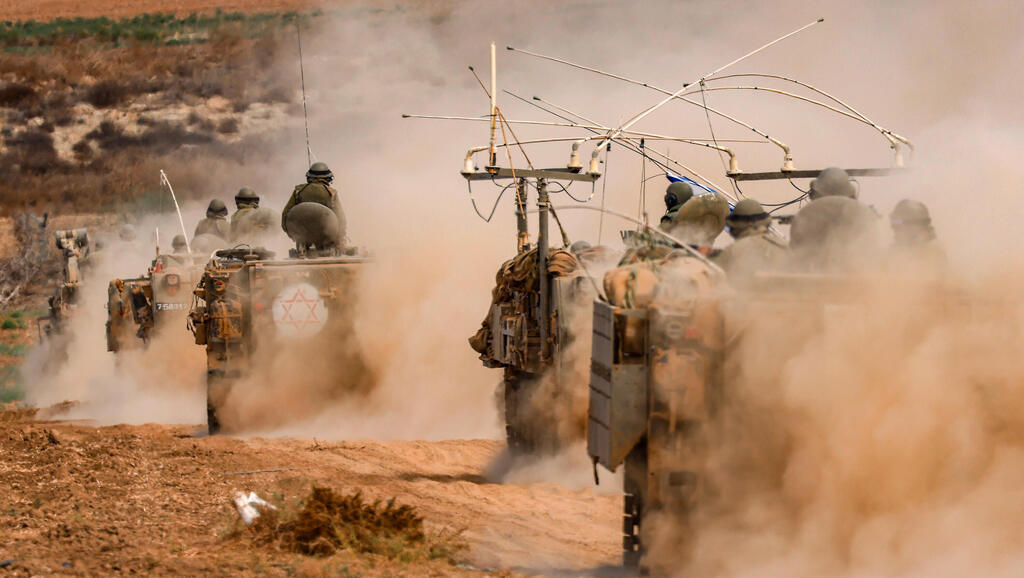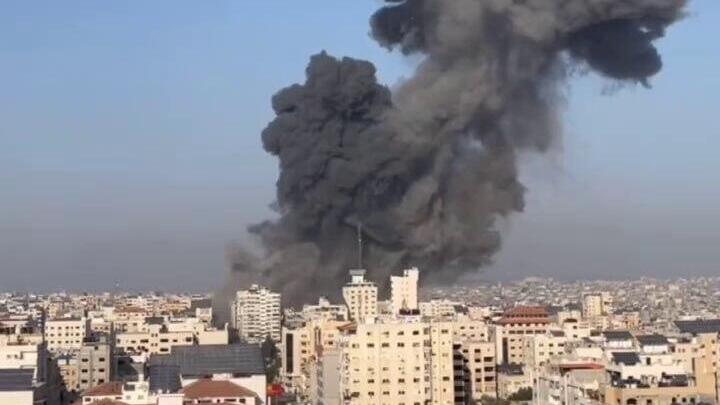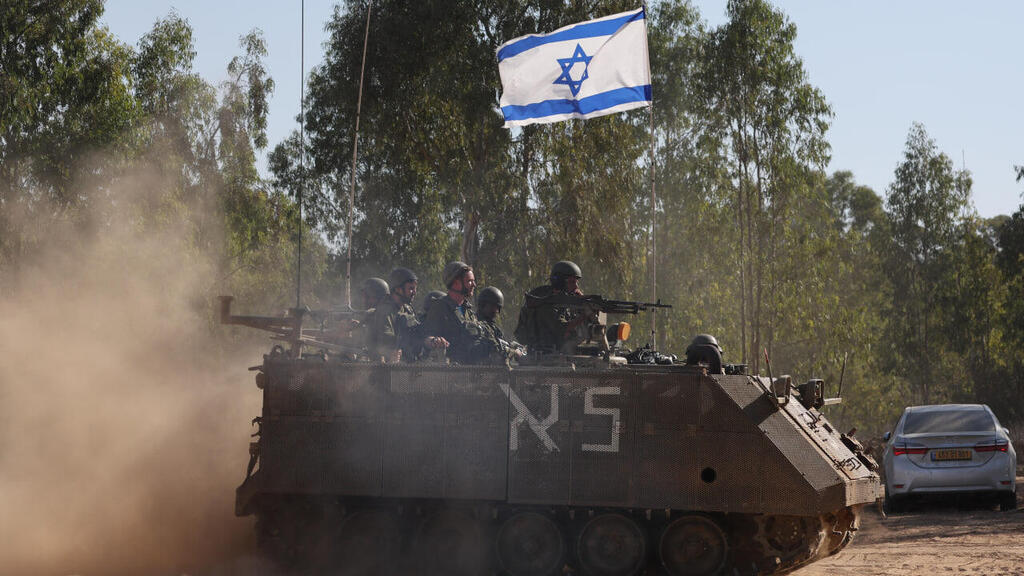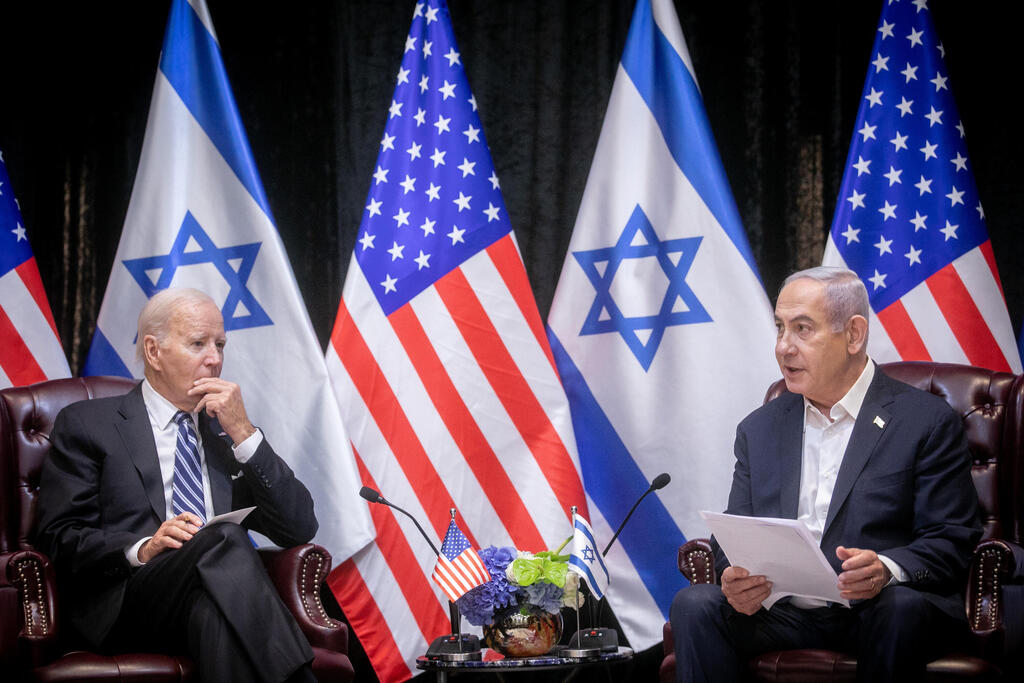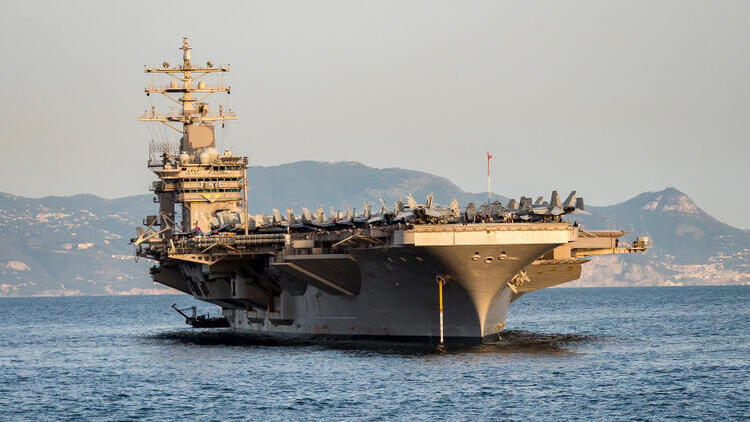It seems the Israel Defense Forces and the State of Israel have a clear understanding of what they want to achieve and how to do so in each of the planned stages of the war against Hamas. Prime Minister Benjamin Netanyahu emphasized this Wednesday when he said the ground offensive into the Gaza Strip and the return of the Israeli captives are two equally important goals from the government's perspective, and that the determination to achieve both will be pursued simultaneously, without one coming at the expense of the other.
More stories:
In simple terms, Israel will act to release the captives – all of them – as if there were no plans for a ground offensive, and it will carry out the ground offensive at a time that’s suitable for it, even if the issue of captives in Gaza isn’t fully resolved.
This means that Israel is taking the time to pressure Hamas, both to prepare the ground offensive by striking targets in Gaza and to tighten the siege to compel the terror organization to deal with the issue of the Israeli captives it still holds.
The targets in Gaza attacked by Israel are intended to serve both the short- and long-range military goals it has. According to all signs, Hamas leader Yahya Sinwar still appears to be euphoric, and it’s likely he believes Israel won’t dare to take over the northern part of the Strip as long as the fate of the captives remains in his hands.
What primarily hinders Hamas in Gaza right now is the issue of fuel. UNRWA still has an adequate amount of fuel to keep the main hospitals in the Strip fully functional, but Hamas lacks the fuel needed to operate the generators that supply clean air to its tunnels
However, statements from his associates in Hamas leadership in Qatar and Lebanon suggest that their view of the situation is somewhat less optimistic. It’s more likely they may be pressuring the stubborn Gaza leadership to address the hostage issue right away.
What primarily hinders Hamas in Gaza right now is the issue of fuel. UNRWA still has an adequate amount of fuel to keep the main hospitals in the Strip fully functional, but Hamas lacks the fuel needed to operate the generators that supply clean air to its tunnels, bunkers and command posts located deep underground throughout the Strip.
The electricity provided by the generators is also used to power warning systems, cameras, military equipment, and remote launch pads of rockets and mortars, as well as their production factories. Without fuel, a significant part of the command and a large part of Hamas’ combative capabilities become non-functional.
In a location close to Rafah, there exists a fair number of fuel tankers the IDF doesn’t target, since they belong to UNRWA. Hamas still manages to appropriate fuel from some of these tankers, but most of them are used for the UN's refugee agency. Israel needs to continue taking action to prevent the supply of fuel to the Strip that may reach Hamas.
There is no humanitarian consideration that would justify, even from the perspective of international law, aiding the operation of Hamas's rocket launching, command and control systems.
Regarding the Israeli captives, the number is updated every few days because many of the dead, missing and those held hostage are foreign workers from Thailand and Nepal, whose identification takes a long time and significant forensic effort, often with assistance from the victims' countries of origin, which the Gazan jihadists mutilated with unbelievable brutality.
Preparing to destroy Hamas
I believe that, as time goes on, Israel's situation is improving from a military standpoint. While the leeway of international legitimacy may be drawing closer to the end, it means Israel's action requires haste and speed, but that’s only on the surface. In practice, the war we’re currently engaged in is a war for our very existence.
Benny Gantz was mistaken in his wording when he said otherwise. He meant to say that as long as the IDF remains capable and its soldiers remain highly motivated, no enemy can destroy the State of Israel. This is true, but this war is about our ability to live and feel secure anywhere in the country, including when farming and raising crops close to the border, without needing to go to war every few years to protect or, God forbid, avenge our children.
If Israel doesn’t neutralize the military and political capabilities of Hamas, Islamic Jihad and other jihadist organizations in Gaza, residents living close to the northern border won't be able to sleep soundly. Even residents in Tel Aviv would be fearful of the possibility of Iran entering the war.
The barbaric attack and what will follow it in the future indicate that, without establishing a new and robust deterrence doctrine, we won't be able to maintain a normal way of life in this country.
In Israel’s War of Independence, our parents and grandparents fought for the Jewish people to have a homeland where they could live as a nation. Today's jihadists, from Hamas to Hezbollah and ISIS, want to revert the situation in the Middle East to what it was before 1948. Not in one blow, but in stages: first to intimidate us and create fear and, in the second stage, to force us to emigrate because normal life here would be impossible.
This historical explanation is essential to make clear why the Israeli government and all security forces are determined to carry out the ground offensive, without which we can’t eliminate Hamas and Islamic Jihad in the same way ISIS was eliminated.
While it’s impossible to eliminate the jihadist idea rooted in ancient Islam, we can ensure that jihadists do not have the means to implement their global Islamic emirate ideology through blood, fire and decapitations.
An exit strategy should come at a later time
The current pause isn’t necessarily a delay in the operational plan, but rather one made to realize the maximum of what can be achieved through airstrikes and limited, short-range ground operations, such as the one carried out on Wednesday.
Both are designed to achieve the same goal: to weaken the enemy and create uncertainty and tension within its ranks, forcing it to constantly deal with questions like how and when they’ll be attacked and how we plan to overcome their defensive infrastructure based on underground warfare.
Hamas knows a lot about us and what we knew about them before October 7. Nowadays, the IDF and Shin Bet are working tirelessly to update the target banks in Gaza and attack them, including elusive targets that are expected to disappear very quickly. Hamas and Islamic Jihad are experienced and cunning enemies, and the more skilled IDF forces enter enemy territory, with plans based on higher-quality intelligence, the fewer lives will be lost.
The risk of casualties will grow once entry into the Gaza Strip is completed, when the IDF and the Shin Bet will operate in the area with the aim of systematically destroying Hamas’ terrorist infrastructure, military equipment and, primarily, their commanders and soldiers. This stage, following the conclusion of the offensive, is the most dangerous and requires careful consideration before entering.
Discussions on a plan to exit Gaza will need to be held several months from now. The American demand that Israel should present them with a withdrawal plan before entering is unreasonable and is based on their trauma from Afghanistan and Iraq, as well as our experience from the First Lebanon War.
An exit strategy is prepared only after determining which of the objectives were achieved and based on the military and diplomatic situation at that time. If the American demand is merely that Israel commits not to stay in the Strip, I believe it's a non-issue. U.S. President Joe Biden has already received such an assurance from Netanyahu.
Why the offensive hasn't commenced
Israel isn’t launching a full-scale ground offensive in Gaza right now for the following reasons:
1. Israel needs to give more time to exhaust efforts to release the captives through Egyptian and Qatari mediators. The international pressure on Hamas needs to start yielding results, making the organization understand that the release of individual captives over an extended period won’t deter Israel from entering the Strip.
Maybe it’s the opposite: Some decision-makers in Israel believe that it’s necessary to make it clear to Sinwar that when tanks move above the tunnel he's hiding in, it’ll be harder for him to secure any concessions. Thus, it's better to reach an agreement while he still has the nefarious “ace” still up his sleeve.
2. The stage of Gaza’s continuous pounding, provocation and response to the attack isn’t complete yet, and there's more to achieve through these actions.
3. The Americans want to prepare for a potential attack by Iran's proxies, the Shiite militias in Iraq, Syria, Yemen and other places, on American bases in the Middle East. The Pentagon wants to deploy air defense systems, ground units to protect the bases, and missile interceptors, which will thwart any missile launch aimed at Israel.
These preparations won't be complete until the Dwight D. Eisenhower Carrier Strike Group arrives in the Indian Ocean from the south of Oman and Iran, and as long as the U.S. hasn't finished its ground deployment in small bases in Syria.
There have been 14 attacks on American bases in the Middle East by Iran's proxies in the war so far. About 24 American soldiers received minor injuries, and the damage was minor. However, if and when Israel enters Gaza, the number of attacks could increase significantly.
5. Israel needs to enhance its preparedness for a full confrontation with Hezbollah on the northern front.



